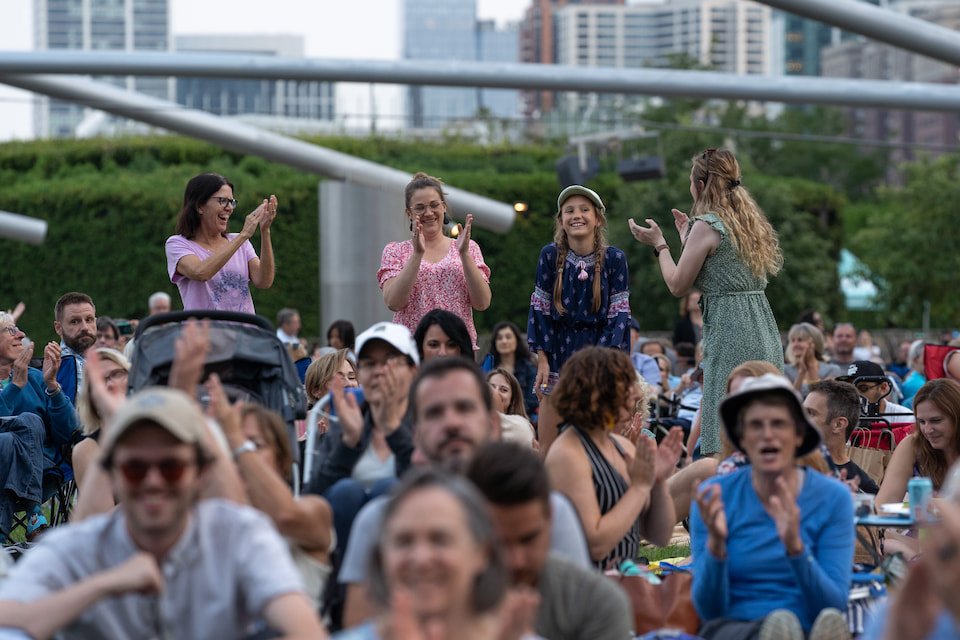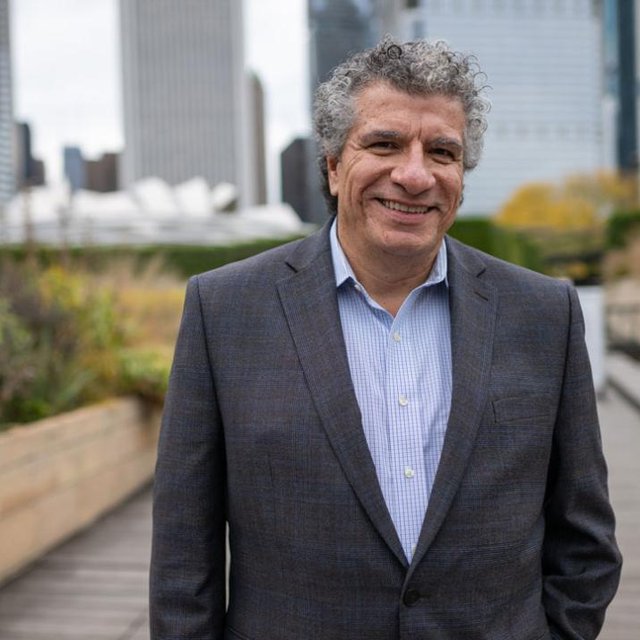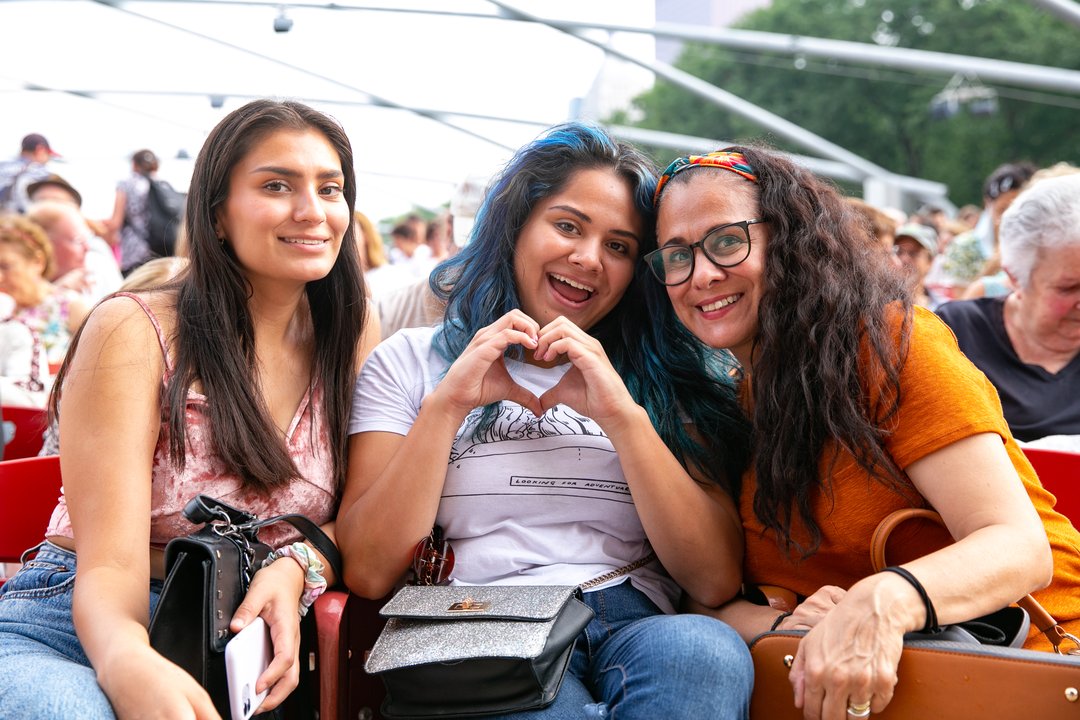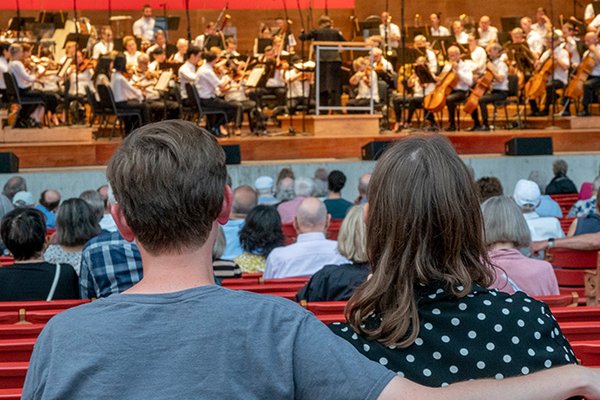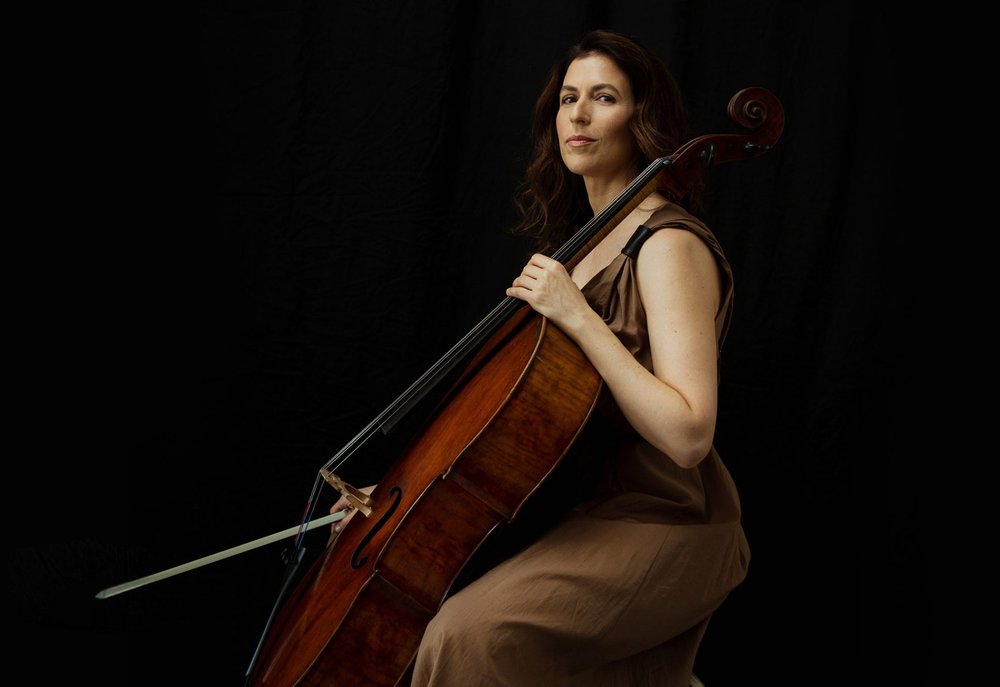
Elgar Enigma Variations
Program
Johann Strauss Jr. Overture to Die Fledermaus (9 mins)
Anna Clyne Dance (25 mins)
...when you're broken up
...if you've torn the bandage off
...in the middle of fighting
...in your blood
...when you're perfectly free
Edward Elgar Enigma Variations (31 mins)
Enigma: Andante
Var.I. "C.A.E." L'istesso tempo
Var. II. "H.D.S.- P." Allegro
Var. III. "R.B.T." Allegretto
Var. IV. "W.M.B." Allegro di molto
Var. V. "R.P.A." Moderato
Var. VI. "Ysobel" Andantino
Var. VII. "Troyte" Presto
Var. VIII. "W.N." Allegretto
Var. IX. "Nimrod" Moderato
Var. X. "Dorabella” Intermezzo. Allegretto
Var. XI. "G.R.S." Allegro di molto
Var. XII. "B.G.N." Andante
Var. XIII. "***” Romanza. Moderato
Var. XIV. "E.D.U." Finale
Featuring
-
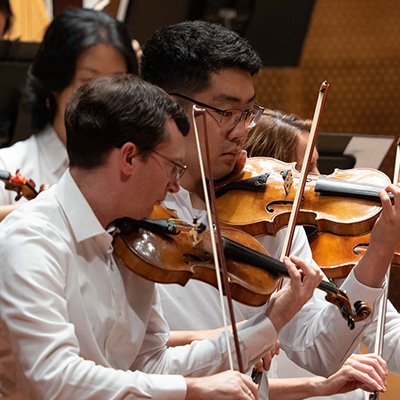
Grant Park Orchestra
Orchestra
-

Courtney Lewis
Conductor
-
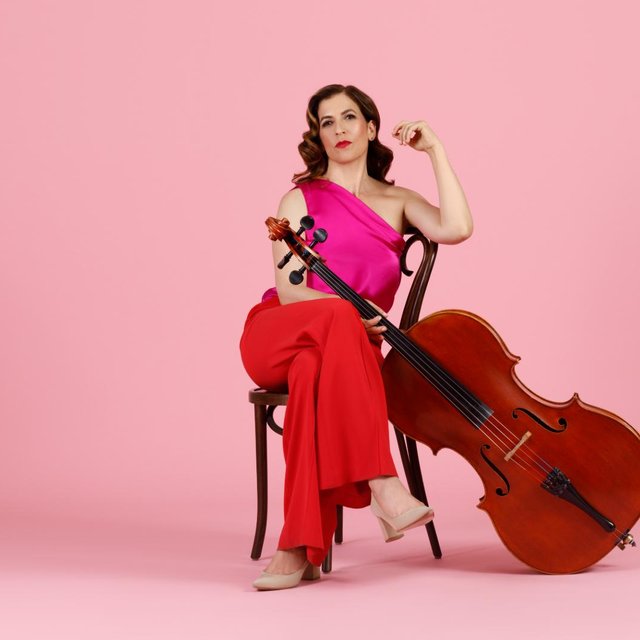
Inbal Segev
Cello
Program Notes
Johann Strauss Jr. (1825–1899)
Overture to Fledermaus (1874)
Scored for: two flutes including piccolo, two oboes, two clarinets, two bassoons, four French horns, two trumpets, three trombones, timpani, percussion, and strings
Performance time: 9 minutes
First Grant Park Orchestra performance: August 24, 1935; Ebba Sundstrom, conductor
Where Johann Strauss Sr. elevated the Viennese waltz from its humble origins as a rural Austrian dance to a fashionable musical entertainment in the early 19th century, his son cemented it as the height of sophistication and elegance. Nicknamed “The Waltz King,” Johann Strauss Jr. also wrote a number of operettas, though none so successful as Die Fledermaus (The Bat), which premiered at Theater an der Wien in 1874.
In a nutshell, Gabriel von Eisenstein, a wealthy Viennese aristocrat, is sentenced to eight days in prison after humiliating a notary named Dr. Falke, having abandoned him in a public park dressed as a bat after a night of drunken revelry. He manages to delay his stint in jail so he can attend a masked ball thrown by the Russian Prince Orlofsky, which ends up being a ploy for Falke to get his revenge. Shenanigans ensue, complete with mistaken identities and disguises, all to the score of Strauss’s sparkling melodies and rhythmic vitality. The Overture to Die Fledermaus contains the opera’s central waltz, plus other memorable themes from the show, which bubble like the finest champagne.
Anna Clyne (b. 1980)
Dance (2019)
Scored for: two flutes including piccolo, two oboes including English Horn, two clarinets including bass clarinet, two bassoons including contrabassoon, two French horns, two trumpets, trombone, tuba, timpani, percussion, strings, and solo cello
Performance time: 25 minutes
First Grant Park Orchestra performance
Dance, when you’re broken open.
Dance, if you’ve torn the bandage off.
Dance in the middle of the fighting.
Dance in your blood.
Dance, when you’re perfectly free.
– Rumi
These words by the 13th-century Persian poet Rumi inspired Anna Clyne’s concerto for cello and orchestra, Dance (2019). Each of the concerto’s five movements takes its title from a line of the poem, which encourages dancing both in times of pain and in times of joy. “I knew that I wanted to write a multi-movement work in which each movement had its own personality, its own character,” Clyne writes in the liner notes of the premiere recording featuring tonight’s soloist, cellist Inbal Segev. She continues, “I’ve known this Rumi poem for a while and always thought it would be a good source of inspiration—it’s short, has repetition, a clear form of five lines and a strong physicality (for example, ‘broken open,’ ‘in your blood’). It also has a sense of urgency that I found compelling for this piece.”
In 2016, conductor Marin Alsop introduced Segev and Clyne, and the three struck up a creative partnership. As an amateur cellist herself, Clyne was excited by the prospect of composing a cello concerto for Segev. Dedicated to Clyne’s father, Dance combines the cultures of Clyne’s English–Irish family and Polish–Jewish ancestry as well as Segev’s background as an Israeli–American. In addition to these cultural influences, the work is firmly rooted in musical traditions of the past. “Anna’s music has an old-soul sensibility but is fresh and modern at the same time,” Segev explains. “This juxtaposition of old and new has always appealed to me; it suits my playing, as well as the tone of my 1673 Ruggieri cello.”
In the first movement, “when you’re broken open,” the cello intones a slow melody over a placid bed of orchestral sound, with bowed vibraphone adding a glassy, ethereal quality. The second movement, “if you’ve torn the bandage off,” is more angular, though a lyrical folk-like melody accompanied by sweeping arpeggios offers some reprieve from the ferocity. Hearkening back to the Baroque, “in the middle of the fighting” takes the form of a lament over a repeated descending bassline. The fourth movement, “in your blood,” also recalls musical forms of the past with a canon that becomes increasingly dense as more layers are added. Finally, “when you’re perfectly free” begins in anguish, complete with col legno snaps, before another expansive melody emerges.
Edward Elgar (1857–1934)
Enigma Variations (Variations on an Original Theme), op. 36 (1898)
Scored for: two flutes including piccolo, two oboes, two clarinets, three bassoons including contrabassoon, four French horns, three trumpets, three trombones, tuba, timpani, percussion, and strings
Performance time: 31 minutes
First Grant Park Orchestra performance: August 7, 1940; Hans Lange, conductor
Much ink has been spilled deciphering the supposed “Enigma” of Edward Elgar’s Variations on an Original Theme, Op. 36, or Enigma Variations. The word “Enigma” was only penciled into the score shortly before the premiere by Elgar’s publisher, August Johannes Jaeger. Nevertheless, the name stuck, and the mystery helped drum up publicity. Before the first performance on June 19, 1899, Elgar added to the intrigue, saying, “The ‘Enigma’ I will not explain—its ‘dark saying’ must be left unguessed, and I warn you that the apparent connection between the Variations and the Theme is often of the slightest texture; further, through and over the whole set another and larger theme ‘goes’, but is not played . . . so, the principal Theme never appears.”
Some have taken this to mean that a famous piece of music could be layered on top as a counterpoint to the work’s theme. Scholars and armchair detectives alike have proposed numerous solutions, but we will likely never know the answer (if there even is one). Although Elgar was fond of puzzles and ciphers, he could have meant a more abstract silent theme—that of friendship. Each of the variations presents a musical sketch of one of his friends. “It may be understood that these personages comment or reflect on the original theme and each one attempts a solution of the Enigma, for so the theme is called,” Elgar clarified in a program note in 1911. Elgar further stated that the Enigma theme represented the “loneliness of the artist.” Therefore, in each variation, his friends provide their own solution to his loneliness through their companionship and support—something Elgar was in dire need of at the time as a struggling composer prone to depression. In a way, these musical portraits of his friends did solve his problem, as the Enigma Variations finally catapulted Elgar’s career at the age of 42.
Enigma Variations begins with a statement of the main theme, which came to Elgar while noodling on the piano with a cigar in his mouth after a long day of teaching. He then began to imagine how his different friends might play the melody, labeling each variation with a nickname or the initials of the dedicatee. The first variation, “CAE,” is a romantic expansion of the theme dedicated to his wife, Caroline Alice Elgar. Next, “HDS-P” refers to Hew David Stewart-Powell, an adept amateur pianist. “RBT” depicts Richard Bater Townsend, who took to riding around Oxford on a tricycle, ringing the bell constantly as he went. “WMB” then represents the brusque country squire William Meath Baker, while the chuckling woodwinds in “RPA” capture the nervous laugh of Richard Penrose Arnold. The opening viola passage in “Ysobel” pokes fun at Elgar’s viola student Isabel Fitton, who struggled with string crossing, though the composer’s affection for her is evident in the movement’s overall tenderness. “Troyte” invokes another student of Elgar’s, an architect named Arthur Troyte Griffin, who was apparently a clumsy piano player. Next, “WN” suggests not just Winifred Norbury’s characteristic laugh but also her beautiful 18th-century house.
Here we come to the most famous variation, “Nimrod,” dedicated to Elgar’s publisher, Jaeger. (The nickname comes from the Biblical hunter Nimrod, as “Jaeger” means “hunter” in German.) Jaeger was perhaps the most supportive figure in Elgar’s life after Alice. Jaeger had been on the receiving end of Elgar’s mood swings and letters declaring he was done with music, yet he remained convinced of Elgar’s talent. “Dorabella” is another tender variation for a supportive friend, Dora Penny. While “GRS” stands for organist George Robertson Sinclair, the variation actually captures an incident where Sinclair’s bulldog, Dan, fell into the River Wye (successfully escaping the waters and barking in triumph). Next, the heartfelt cello melody of “BGN” is an homage to amateur cellist Basil G. Nevinson. “***” is the most mysterious of the variations. Elgar claimed it was dedicated to Lady Mary Lygon, who was embarking on a sea voyage at the time (hence the references to Mendelssohn’s Calm Sea and Prosperous Voyage). However, some believe it is a nod to Elgar’s first love, Helen Jessie Weaver, who emigrated to New Zealand after breaking off their engagement in 1885. Finally, the artist himself emerges triumphant in “EDU” (Alice’s nickname for Edward), supported by the love of his friends.
—Katherine Buzard
Artistic Leadership
-

Christopher Bell
Chorus Director
Support The Festival
Violin I
Jeremy Black, concertmaster
Vacant, assistant concertmaster
Trista Wong
Zulfiya Bashirova
Jennifer Cappelli
Injoo Choi
Dima Dimitrova
Erica Hudson
Hyewon Kim
Matthew Lehmann
Jayna Park
Rika Seko
Karen Sinclair
Bonnie Terry
Krzysztof Zimowski
Violin II
Liba Shacht, principal
Vacant, assistant principal
Ying Chai
Ran Cheng
Karl Davies
Likai He
Ann Lehmann
Laura Miller
Cristina Muresan
Kjersti Nostbakken
Irene Radetzky
Jeanine Wynton
Thomas Yang
Viola
Terri Van Valkinburgh, principal
Yoshihiko Nakano, assistant principal
Elizabeth Breslin
Beatrice Chen
Amy Hess
Rebecca Swan
Chloé Thominet
Cello
Walter Haman, principal
Peter Szczepanek, assistant principal
Calum Cook
Larry Glazier
Steven Houser
Eric Kutz
Eran Meir
Double Bass
Colin Corner, principal
Peter Hatch, assistant principal
Andrew Anderson
Christian Luevano
Samuel Rocklin
Chunyang Wang
Chris White
Flute
Vacant, principal
Alyce Johnson
Jennifer Lawson, assistant principal
Piccolo
Jennifer Lawson
Oboe
Mitchell Kuhn, principal
Vacant
Anne Bach, assistant principal
English Horn
Anne Bach
Clarinet
Dario Brignoli, principal
Trevor O’Riordan, assistant principal
Besnik Abrashi
Bass Clarinet
Besnik Abrashi
Bassoon
Eric Hall, principal
Nicole Haywood Vera Tenorio, assistant principal
Vacant
Contrabassoon
Vacant
Horn
Vacant, principal
Stephanie Blaha, assistant principal
Neil Kimel
Brett Hodge
Paul Clifton
Trumpet
David Gordon, principal
Mike Brozick
Vacant, assistant principal
Vacant
Trombone
Daniel Cloutier, principal
Jeremy Moeller, assistant principal
Bass Trombone
Alexander Mullins
Tuba
Andrew Smith, principal
Timpani
Daniel Karas, principal
Josh Jones, assistant principal
Percussion
Josh Jones, principal
Vacant, assistant principal
Doug Waddell
Harp
Kayo Ishimaru-Fleisher, principal
Keyboards
Christopher Guzman
Orchestra Librarian
Eliza Bangert, principal
Grant Park Chorus
* denotes leave-of-absence † 2025 Vocal Fellow
Laura Lynch Anderson
Kristina Bachrach
Madalynn Baez
Megan E. Bell
Alyssa Bennett
Tamara Bodnar
Kylie Buckham
Anna Joy Buegel
Laura Bumgardner
Katherine Buzard
Bethany Clearfield
Nathalie Colas
Carolyne DalMonte
Megan Fletcher
Kaitlin Foley
Saira Frank
Julia Frodyma
Katherine Gray-Noon
Kimberly Gunderson
Alexandra Ioan
Alexandra Kassouf
Darlene Kelsey
Olivia Knutsen
Marybeth Kurnat
Katelyn Lee
Kyuyim Lee+
Rosalind Lee
Veronica Mak
Hannah Dixon McConnell
Marie McManama
Kathleen Monson
Susan Nelson
Evangeline Ng
Máire O'Brien
Alexandra Olsavsky
Laura Perkett
Angela Presutti Korbitz
Alexia Rivera
Veronica Samiec
Emily Sinclair
Molly Snodgrass
Tiana Sorenson
Christine Steyer
Sarah van der Ploeg*
Lydia Walsh-Rock
Sherry Watkins
Emily Amesquita
Melissa Arning
Christina Bernardoni
Angela Born
Bethany Brewer
Julie DeBoer
Leah Dexter
Katrina Dubbs
Stacy Eckert
Margaret Fox
Catarine Hancock
Ruth Ginelle Heald
Sophia Heinz
Miya Higashiyama
Carla Janzen
Amy Allyssa Johnson
Kathryn Kinjo Duncan
Amanda Koopman
Anna Laurenzo
Jeannette Lee
Thereza Lituma
Chelsea Lyons
Victoria Marshall
Jessica McCarthy
Quinn Middleman
Ella Peters
Sarah Ponder
Emily Price
Stephanie Schoenhofer
Suzanne A. Shields
Marissa Simmons
Cassidy Smith
Aidan Spencer
Alannah Spencer
Margaret Stoltz
Carolyn Sundlof Boudreau
Gabrielle Timofeeva López
Elizabeth Vaughan
Corinne Wallace-Crane
A.J. Wester
Debra Wilder
Isabel Yang+
Charles Anderson
Enrico Giuseppe Bellomo
Justin Berkowitz
Madison Bolt
Hoss Brock
Steven Caldicott Wilson
Opal Clyburn-Miller+
John J. Concepción
Micah Dingler
Jared V. Esguerra
Alec Fore
Ace Gangoso
Klaus Georg
Tejas Gururaja
Paul Hunter
Garrett Johannsen
William Johnson
James Judd
Tim Lambert
Tyler Lee
Stephen D. Noon
Marcos Ochoa
Brett Potts
Nicholas Pulikowski
Peder Reiff
Samuel Rosner
Matthew W. Schlesinger
Joe Shadday
Aaron Short
Brian Skoog
Michael St. Peter
Ryan Townsend Strand
Alan Taylor*
Sean J. Watland
Nate Widelitz
Walter Aldrich
Evan Bravos
Matthew Brennan
Michael Cavalieri
Ryan J. Cox
Ed Frazier Davis
Lifan Deng
Matthew Dexter+
Chris DiMarco
Christopher Filipowicz
Dimitri German
Dominic German
David Govertsen
Spencer Greene
Brian Hupp
Jan Jarvis
Jess Koehn
Eric Miranda
Ian Morris
Ian Murrell
John E. Orduña
Wilbur Pauley
Douglas Peters
Jackson Pierzina
Martin Lowen Poock
Ian Prichard
Dan Richardson
Stephen Richardson
Benjamin D. Rivera
Scott Uddenberg
Schyler Vargas
Vince Wallace
Aaron Wardell
Ronald Watkins
Jonathon Weller
Peter Wesoloski
Jonathan Wilson
Chuck Foster
John Goodwin
Kyuyim Lee
Isabel Yang
Opal Clyburn-Miller
Matthew Dexter
